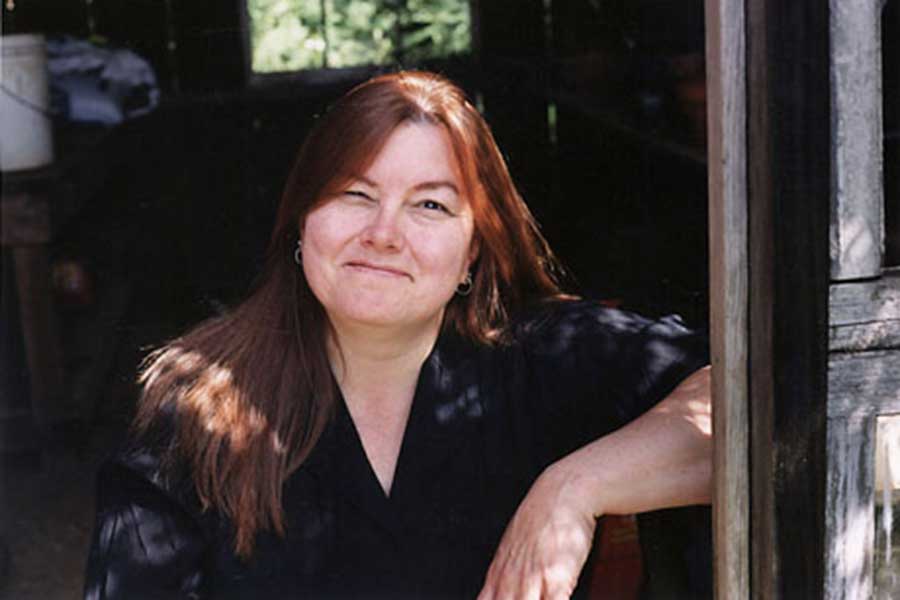Acclaimed LGBT author Dorothy Allison visits the University of Pennsylvania as part of its Kelly Writers House Fellows program March 23-24.
Allison, who once described herself as a “cross-eyed, working-class lesbian, addicted to violence, language and hope,” will do a reading on the first evening and an informal Q&A the following morning.
Both talks take place in the Arts Café located inside the Kelly Writers House, 3805 Locust Walk. The events are free and open to the public, although an RSVP is requested. (To RSVP, email [email protected] or call 215-573-4843.)
The KWH Fellows program, now in its 17th year, brings noteworthy authors to campus for two days of intensive interaction with students interested in becoming writers themselves.
According to Julia Bloch, associate director of KWH, Allison is an ideal participant.
“She is one of those writers who is very well-known and very eminent but also very accessible,” Bloch said. “And I just had the feeling that she would be a really good fit for this particular program, which asks writers to be open with their time, open with discussing their practice and their approaches to writing, and available for a lot of intimate, open conversation with students and community members.”
Allison is the author of six books, including “Trash,” a Lambda Award-winning short story collection, and “Skin,” a volume of essays about class, sex and writing. Born in South Carolina to an unwed 15-year-old mother, much of her writing is autobiographical and remarkably candid.
Originally, Allison’s work appeared in journals and books published by feminist and lesbian presses. She reached a wider audience in 1992 when her first novel, “Bastard Out of Carolina,” was released.
The book is an unflinching examination of family dysfunction, rural poverty and sexual abuse. It was nominated for a National Book Award, and in 1996, Anjelica Huston directed a well-received movie adaptation starring Jennifer Jason Leigh. Penguin recently released a special 20th-anniversary edition with a new afterword by Allison.
The Penn undergraduates involved in the KWH Fellows program are reading that novel as part of a semester-long course in which they delve deeply into the work of visiting fellows. Bloch, who is teaching that class, described working through the book with her students as a moving experience.
“I think the class that we spent on ‘Bastard Out of Carolina’ was one of the most powerful classes I’ve ever participated in,” she noted. “And I say ‘participated in’ because I don’t feel as though I really taught it. I feel as though we all taught it together. Encountering this book, whether it’s for the first time or the fifth or sixth time, is an emotional, powerful, inspiring experience.”
Allison’s writing also makes great demands on readers. Given her frank depiction of troubling topics like sexual abuse and the unruliness of physical desire, it’s no surprise that her work has not always been met with approval from critics, family members or even her peers. She cheekily acknowledged their disapproval by calling her 1983 volume of poems “The Women Who Hate Me.”
In Bloch’s opinion, Allison’s willingness to tackle tough themes is what makes her such a groundbreaking writer.
“When Allison started publishing her work, she quickly became known as one of the first lesbian feminist writers to address topics of family abuse and sexuality openly and with a kind of bravery that had not been seen in the literary world before in quite this way,” Bloch said.
It is important to note that Allison does not approach these topics in a detached or voyeuristic manner. She was sexually abused by her stepfather and threw herself headlong into contentious debates taking place in lesbian and feminist circles during the 1970s and ‘80s.
Bloch, a queer author herself — her collection of poems, “Letters to Kelly Clarkson,” was a 2013 Lambda Literary Award finalist — is exploring the political and cultural dimension of Allison’s work with her students.
“Those conversations that I’ve been having with my students have been really powerful because, in many ways, we’re still working through the same kinds of issues, taboos, fears and political aims that surround different expressions of sexuality in American feminism today,” Bloch said.
One of the great things about the KWH Fellows program is that it is not limited to Penn students; Philadelphians who love great writing are encouraged to attend and participate in its public programs.
Located in the former house of the campus chaplain, KWH is a cozy, welcoming atmosphere, even if it is a bit snug.
“The intimacy is part of it, honestly; cramming into a small space and sitting on slightly uncomfortable chairs is part of what makes it a really charming, community experience,” Bloch joked.
For those who cannot attend in person, both events will be live-streamed on KWH-TV.
To learn more, visit www.writing.upenn.edu/wh.
